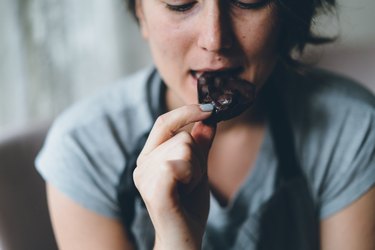
Nobody likes stinky sweat or putrid-smelling pits. Still, if your perspiration produces a perfume-like plume or a saccharine scent, you might be confused. And, perhaps, kind of delighted. Sweet-smelling sweat is better than bad BO...right?
Well, probably not. The thing is, your sweat shouldn't smell like a flowery body spray. In fact, a sugary stink is sometimes a sign that something's off in your body and you need to be checked out by a doctor.
Video of the Day
Video of the Day
Here, Deena Adimoolam-Gupta, MD, a New York City-based endocrinologist and internist, helps solve this smelly mystery, explaining why your sweat smells sweet like caramelizing sugar or syrupy waffles (including when it can be dangerous to your health and what you should do about it).
Tip
If you experience a sudden increase in sweating, change in body odor or body odor that smells fruity (or bleach-like), see a doctor immediately, as these can all be red flags of a serious medical issue, according to the Cleveland Clinic.
1. The Smell: Fruity
The Culprit: Diabetic Ketoacidosis
Fruity-scented sweat (or breath or urine) could be a sign of a serious complication of diabetes called diabetic ketoacidosis
"This occurs in individuals with diabetes, mostly type 1, if blood glucose levels are not managed," Dr. Adimoolam-Gupta says.
Here's why: "When glucose levels are too high, and there's not enough insulin to decrease the blood glucose values, this leads to the formation of ketones [a kind of chemical produced by your liver when it breaks down fats], which have a sweet smell," she explains.
Other symptoms of diabetic ketoacidosis may include the following, per the Mayo Clinic:
- Excessive thirst
- Frequent urination
- Nausea and vomiting
- Stomach pain
- Weakness or fatigue
- Shortness of breath
- Confusion
Fix it: If you have any of the above signs of diabetic ketoacidosis, seek medical treatment immediately. This condition must be urgently treated with insulin and intravenous fluids, Dr. Adimoolam-Gupta says. Left unchecked, diabetic ketoacidosis can result in a coma or even death.
Fortunately, you can reduce your risk of ketoacidosis by managing your diabetes (through diet, exercise, medication and daily monitoring of your blood sugar) to ensure your glucose values are in a proper target range, Dr. Adimoolam-Gupta says.
2. The Smell: Burnt Sugar (or Maple Syrup)
The Culprit: Maple Syrup Urine Disease
If your sweat, urine or ear wax has an aroma of burnt sugar, you may be dealing with maple syrup urine disease (MSUD).
"This is a rare genetic disorder [usually diagnosed at birth or in early childhood] characterized by deficiency of an enzyme called branched-chain alpha-keto acid dehydrogenase," Dr. Adimoolam-Gupta says.
This enzyme helps break down certain amino acids in the body, including leucine, isoleucine and valine, which are found in foods containing protein, according to the Cleveland Clinic.
Because the enzyme is either completely or partially absent, it leads to a buildup of these amino acids, which may produce a possible smell of maple syrup or caramelized sugar, Dr. Adimoolam-Gupta says.
In addition to sweet-scented sweat, urine or ear wax, people with MSUD may also experience the following symptoms, per the Cleveland Clinic:
- Poor feeding, vomiting, loss of appetite, irritability
- Sluggish/slow/tiredness and weakness
- Changes in muscle tone — poor muscle tone or muscle tightness/tension
- Abnormal muscle movements, including spasms that cause a backward arching of the head, neck and spine
- Developmental delays
- Seizures, convulsions, respiratory failure and coma (as the condition progresses)
Without proper management, people with MSUD can develop a wide range of complications, from intellectual and physical disabilities to even death.
Fix it: Treatment for MSUD includes dietary changes (the goal is to consume less branched-chain amino acids), Dr. Adimoolam-Gupta says. In other words, you must carefully monitor your protein intake to limit amounts of leucine, isoleucine and valine.
Some people with MSUD even undergo liver transplants to treat the disease, according to the Cleveland Clinic. That's because a healthy liver can produce the proper enzymes needed to break down the amino acids that accrue in the body and cause problems.
3. The Smell: Maple Syrup
The Culprit: You Ate Fenugreek
When your sweat serves up a wafting scent of waffles and maple syrup, your diet may be the reason. Yep, what you put on your plate can make your sweat smell sweat.
Here's why: During digestion, certain foods are broken down into aromatic compounds, which can lead to sweet-smelling scents, Dr. Adimoolam-Gupta says.
Case in point: fenugreek. This herb, commonly used in Indian and Middle Eastern cuisines, according to the UCLA Biomedical Library, contains a strong aromatic compound called solotone, and when your body breaks it down, your pores may produce a maple syrup smell, Dr. Adimoolam-Gupta says.
Fix it: Luckily, there's a simple fix. To stop stinking like the inside of an IHOP, simply limit your intake of fenugreek.
The Bottom Line
Sweet-smelling sweat can sometimes be caused by eating certain foods, but it may also be a sign of an underlying medical condition, such as diabetes, that needs to be checked out by a health care provider.
If you notice that your sweat smells sweet and you haven't been eating a lot of fenugreek lately, call your doctor or head to your nearest urgent care center.
Is this an emergency? If you are experiencing serious medical symptoms, please see the National Library of Medicine’s list of signs you need emergency medical attention or call 911.


